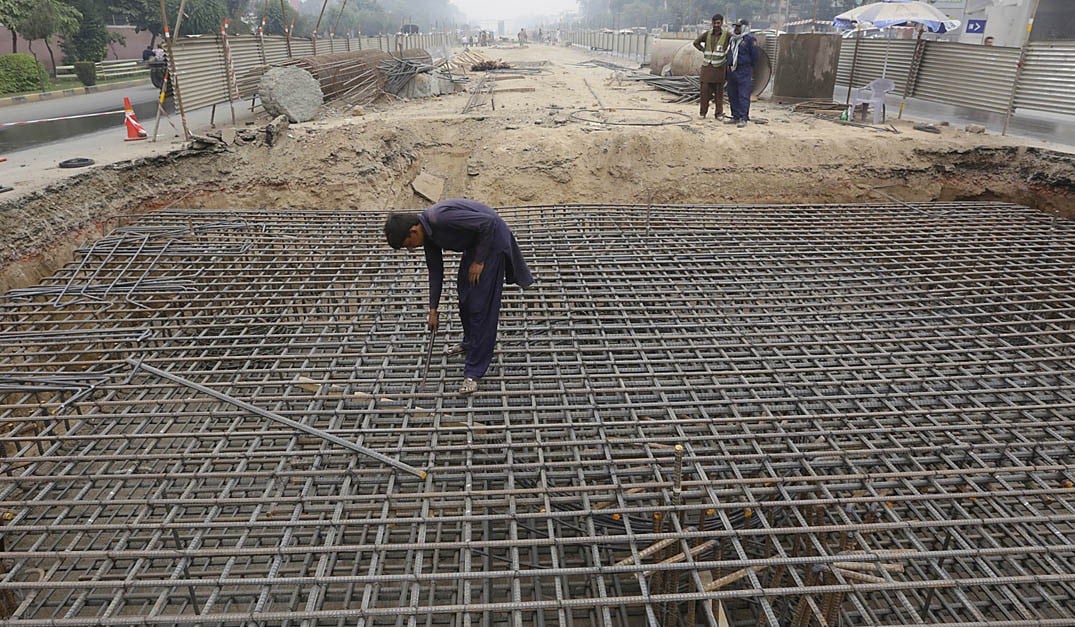
They want me to hail this destruction in the name of a project. How can I do that?

They tell me I have no right to speak against it because I do not represent the ‘class’ that is going to use it. I should not because the government that took the decision is democratically elected. They tell me if I want to oppose, I must contest and win an election and then do what I like with the city.
I say the project has financial and environmental costs. They tell me I should make up my mind whether financial cost bothers me more or environment. I say my city is defaced and I can’t call it my own. They look at me with a sense of pity for I care about abstracts and not about the teeming disadvantaged ‘millions’ who are waiting to hop on it.
I try saying a city like Lahore is swarming with history and culture, with real breathing people constituting that culture, and to uproot so much of it in one go will turn it into something else. They tell me the people are being materially compensated, handsomely, beyond their expectation.
Money compensates for everything, they say. The people who’re uprooted may disagree, or perhaps not. Perhaps, money does buy everything.
Mercifully for them, buildings don’t speak.
This leaves only a few people making noise who would like to see their Chauburji, Shalamar, GPO and other places as they always have. They don’t want to see any harm come into the way of these buildings nor do they want to be deprived of the visual pleasure these buildings have offered for centuries.
It was the so-called intellectual elite that first had an issue with this project, long before the displaced people came to the forefront or the political parties in the opposition made it their cause. It knew ‘visual pleasure’ was unquantifiable. So, it pointed at the incredibly huge cost for this one mass transit project (with the Metro Bus experience providing the benefit of hindsight) at the expense of more pressing needs like health and education and clean drinking water; also at the expense of other regions within the same province.
The response was one of arrogant indifference. No amount of protests will be allowed to come in its way. The one in Rawalpindi/Islamabad is functional, the one in Multan will soon be and then Bahawalpur and so on and so forth.
Way to go.
I’m still a little bothered, unhappy and agitated about how the city is being changed, rendering me alien in a place I chose as home. I have cried at each cut tree, seeing it lying on the side of the road or being taken away in stacks just so that the cars could run faster on wider roads.
Can a democratically elected government really do whatever it wants? Even when it ignores the very instruments of democracy? Even without applying the laws?
Who said the mass transit means a facility for a certain class of people? Does it not mean something that will make people forsake their cars and bikes? Where are the serious policy decisions that curtail the amount of vehicular emissions?
Lahore today is what they made of it. Three decades and more is a long time for a political party to be in power. They have moulded it in the image they liked. No wonder they have this sense of entitlement about the city.
But people here have been very much a part of this ‘development’ journey with them. They exactly remember the first underpass on the canal, then the second and then more. They were discomforted for months, even years, but they knew these were necessary steps that didn’t harm the shared heritage. There were no protests.
Decades ago, the people saw the erecting of a monument near Model Town. They may have joked about it but they didn’t protest and started calling it Kalma Chowk. The only protest, if mild, came when it was being demolished.
The last thirty years have been all about widening of roads and not much about offering a sincere public transport solution. They encouraged private motors and motorcycles, turning the speedy vehicles into menace on roads, discouraged pedestrians, allowed the city to become more polluted (remember the steel railing they put along the canal and no one sits by it anymore?).
They allowed unbridled commercialisation and did not once think of management through traffic engineering.
Now they want me to hail this destruction in the name of a project. How can I do that? You tell me.